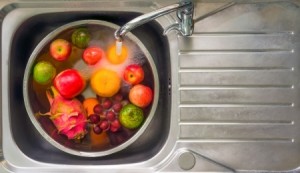There is a disturbing photo, similar to the one below (except there’s no additional bowl in the sink), I’ve seen numerous times being circulated on social media. It promotes washing fruits and vegetables in the kitchen sink with vinegar. I personally find it disturbing — for two reasons:
Sink Traps
1. Sink traps – Under all properly installed sinks is a trap. The trap’s purpose is to hold water in the u-shaped area thereby sealing off methane gasses that would otherwise find their way back into our homes. This drain is not only attached to the same pipe that toilets flush into, it makes a great breeding ground for bacteria — bacteria that can potentially find its way back up into the sink. The only way I know to be certain of no bacteria in the trap, is to disinfect it with bleach. Those of us with septic systems usually avoid bleach like the plague. Even then, I’m not so sure I would trust it to be completely germ-free.
I think a better choice for washing fruits and vegetables, is to use a large bowl in the sink or dedicate a dishpan solely for washing fruits and vegetables.
Image credit: joey333 / 123RF Stock Photo
Genetically Modified Organisms (GMOs)
2. White vinegar – sure white vinegar wasn’t invented to be eaten, it was invented to be used as a cleaning disinfectant, but I’m not sure it’s suitable for disinfecting food. As far as I know, it is made from Genetically modified (GMO) corn that no longer needs to be sprayed with pesticides. BT Corn that is regulated by the Environmental Protection Agency because it was engineered to have insecticide on the INSIDE. Is vinegar a good choice for washing fruits and vegetables? I don’t think so for a couple reasons. I don’t think it makes sense to buy organic, GMO-free foods and wash them with made-from-GMO-grain white vinegar. I do purchase white vinegar for cleaning my coffee pot, setting colors into dark clothes, and sometimes use it to clean my refrigerator. Every time I use it, however, it doesn’t feel right–I feel I’m promoting GMOs. The more often we buy GMOs, the more often they’re manufactured and the bigger the risk of non-GMO foods becoming contaminated.
My favorite fruit/vegetable wash is making my own with soap and Améo essential oils. If you don’t want to make your own, I used Veggie Wash for years and have used Tropical Traditions’ All-Purpose Everyday Cleaner and diluted it roughly 50 to 1.

Bacteria
I think most of us realize that pesticides are systemically consumed by the fruit and vegetables, thereby making it impossible to wash them off. I have no idea if the chemicals, that are sprayed on after harvest to keep them fresh, can be washed off. I’ve been able to finally switch most of my fruits and vegetables to organic. Wouldn’t it be great if everyone switched to organic? Wouldn’t we then only see organic in our supermarkets?
I think it’s useless to wash fruits and vegetables with the intent of removing pesticides. I do think it’s imperative to wash them, if I don’t know and trust my local farmer, to hopefully remove bacteria — listeria, e. coli, etc. Bacteria from CAFOs (Concentrated Animal Feeding Operations, also known as farm factories) is known to run into fields of fruits and veggies – organic or not. If the CAFO is located ‘upstream’ of a field of spinach (or any fruit or vegetable that grows on the ground), it’s almost guaranteed to be contaminated with bacteria.
I also wonder: How many people handled my fruits/vegetables? How many did not wash their hands after using the bathroom? How many sick people handled my fruits/vegetables? I never want to say, “my family member/friend wouldn’t have been so sick (or worse) if I’d washed my vegetables.”
Can I guarantee using a veggie wash or a few drops of essential oil with a few drops of soap will properly disinfect the bacteria from my food? Probably not. I will, however, sleep better at night knowing I at least tried.

[…] and I won’t eat any supermarket vegetables that haven’t first been washed. So after washing the cauliflower: I steamed it, cooled it, pulverized it in my food processor, emptied it into a dish/tea towel, […]